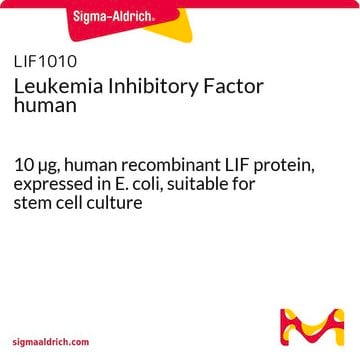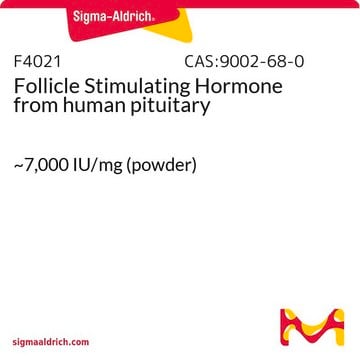A4941
Activin A human
≥95% (SDS-PAGE), recombinant, expressed in baculovirus infected insect cells, lyophilized powder, suitable for cell culture
Synonym(s):
Activin A Protein, Growth Factor, Human Growth Factor
About This Item
Recommended Products
product name
Activin A human, ≥95% (SDS-PAGE), recombinant, expressed in baculovirus infected insect cells, lyophilized powder, suitable for cell culture
biological source
human
Quality Level
recombinant
expressed in baculovirus infected insect cells
Assay
≥95% (SDS-PAGE)
form
lyophilized powder
potency
1-10 ng/mL ED50
mol wt
dimer 26 kDa (containing 116 amino acid residues βA subunits)
packaging
pkg of 10 μg
pkg of 5 μg
technique(s)
cell culture | mammalian: suitable
impurities
endotoxin, tested
UniProt accession no.
storage temp.
−20°C
Gene Information
human ... INHBA(3624)
Looking for similar products? Visit Product Comparison Guide
General description
Application
Biochem/physiol Actions
Physical form
Analysis Note
Signal Word
Warning
Hazard Statements
Precautionary Statements
Hazard Classifications
Eye Irrit. 2 - STOT SE 3
Target Organs
Respiratory system
Storage Class Code
11 - Combustible Solids
WGK
WGK 1
Flash Point(F)
Not applicable
Flash Point(C)
Not applicable
Certificates of Analysis (COA)
Search for Certificates of Analysis (COA) by entering the products Lot/Batch Number. Lot and Batch Numbers can be found on a product’s label following the words ‘Lot’ or ‘Batch’.
Already Own This Product?
Find documentation for the products that you have recently purchased in the Document Library.
Customers Also Viewed
Articles
Naive pluripotent stem cells cultured in vitro using specialized media and inhibitors mimic "ground-state" cells from blastocysts.
Naive pluripotent stem cells cultured in vitro using specialized media and inhibitors mimic "ground-state" cells from blastocysts.
Naive pluripotent stem cells cultured in vitro using specialized media and inhibitors mimic "ground-state" cells from blastocysts.
Naive pluripotent stem cells cultured in vitro using specialized media and inhibitors mimic "ground-state" cells from blastocysts.
Our team of scientists has experience in all areas of research including Life Science, Material Science, Chemical Synthesis, Chromatography, Analytical and many others.
Contact Technical Service









